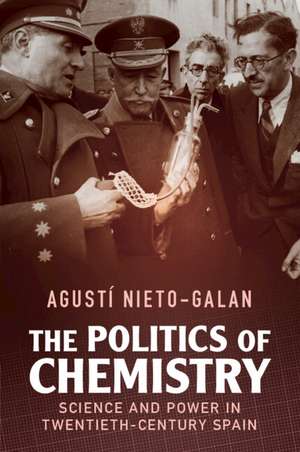The Politics of Chemistry: Science and Power in Twentieth-Century Spain: Science in History
Autor Agustí Nieto-Galanen Limba Engleză Paperback – 26 oct 2022
| Toate formatele și edițiile | Preț | Express |
|---|---|---|
| Paperback (1) | 224.62 lei 6-8 săpt. | |
| Cambridge University Press – 26 oct 2022 | 224.62 lei 6-8 săpt. | |
| Hardback (1) | 587.66 lei 39-44 zile | |
| Cambridge University Press – 21 aug 2019 | 587.66 lei 39-44 zile |
Din seria Science in History
-
 Preț: 274.69 lei
Preț: 274.69 lei - 9%
 Preț: 593.40 lei
Preț: 593.40 lei - 9%
 Preț: 592.86 lei
Preț: 592.86 lei -
 Preț: 406.55 lei
Preț: 406.55 lei -
 Preț: 283.25 lei
Preț: 283.25 lei -
 Preț: 189.98 lei
Preț: 189.98 lei -
 Preț: 306.86 lei
Preț: 306.86 lei -
 Preț: 306.30 lei
Preț: 306.30 lei -
 Preț: 324.96 lei
Preț: 324.96 lei -
 Preț: 324.24 lei
Preț: 324.24 lei -
 Preț: 243.15 lei
Preț: 243.15 lei -
 Preț: 288.42 lei
Preț: 288.42 lei -
 Preț: 221.56 lei
Preț: 221.56 lei -
 Preț: 206.39 lei
Preț: 206.39 lei -
 Preț: 230.49 lei
Preț: 230.49 lei - 11%
 Preț: 584.57 lei
Preț: 584.57 lei - 11%
 Preț: 585.10 lei
Preț: 585.10 lei - 14%
 Preț: 728.56 lei
Preț: 728.56 lei - 11%
 Preț: 642.35 lei
Preț: 642.35 lei - 11%
 Preț: 243.95 lei
Preț: 243.95 lei
Preț: 224.62 lei
Nou
Puncte Express: 337
Preț estimativ în valută:
42.98€ • 44.97$ • 35.70£
42.98€ • 44.97$ • 35.70£
Carte tipărită la comandă
Livrare economică 03-17 aprilie
Preluare comenzi: 021 569.72.76
Specificații
ISBN-13: 9781108712347
ISBN-10: 1108712347
Pagini: 310
Dimensiuni: 152 x 229 x 17 mm
Greutate: 0.42 kg
Editura: Cambridge University Press
Colecția Cambridge University Press
Seria Science in History
Locul publicării:Cambridge, United Kingdom
ISBN-10: 1108712347
Pagini: 310
Dimensiuni: 152 x 229 x 17 mm
Greutate: 0.42 kg
Editura: Cambridge University Press
Colecția Cambridge University Press
Seria Science in History
Locul publicării:Cambridge, United Kingdom
Cuprins
List of figures; Preface; Acknowledgments; Chronology; List of abbreviations; Introduction; Biographies of power; A political chemistry; 1. Dreams of Modernity; 1.1 Cosmopolitanism; 1.2 Laboratories and schools; 1.3 Useful chemistry; 2. A republican science; 2.1 A new enlightenment; 2.2 Nobel visitors; 2.3 The Silver Age of industry; 3. War weapons; 3.1 A chemical civil war; 3.2 A damaged community; 3.3 Tortured skills; 4. Totalitarian ambitions; 4.1 Fascist chemistry; 4.2 Chemistry and religion; 5. Autarchic ambiguities; 5.1 'Our' chemicals; 5.2 'Technical' chemistry; 5.3 Chemical diplomacy; 6. Technocratic progress; 6.1 'Neutral' expertise; 6.2 Cold war allies; 6.3 Corporate chemistry; 7. Liberal dissent; 7.1 Chemists in exile; 7.2 Internal refugees; Conclusion: the moral ambiguity of chemistry; Pure-applied chemistry; Modernisation paradoxes; A troubled identity; Chemists as intellectuals; History and memory; Addendum: Juan Julio Bonet Sugrañes (1940–2006); Bibliography; Index.
Recenzii
'Scientists were prominent in building Spain's democratic Republic - two, the chemist José Giral and the physiologist Juan Negrín, became prime ministers. Science under the Franco dictatorship was dominated by one chemist, José María Albareda while another, Manuel Lora-Tamayo, was Minister of Education and Science in the 1960s. This fascinating and totally original work examines the links between chemistry and politics in a way that casts its light far beyond the specifics of Spain.' Paul Preston, London School of Economics and Political Science
'After taking sides during the Spanish Civil War, chemists either emigrated, endured persecution in Spain, or supported the Franco regime - the latter often selling out their colleagues in the process. Today the Fascist chemists are honored in Spain, but not their victims, an injustice this path-breaking and important book will correct.' Mark Walker, Union College, New York
'Anyone interested in the history of chemistry, the relationship between power and science, and the formations of scientific communities and identities would find this carefully researched book an open invitation to follow further research and explore the unresolved topics that the book elucidates.' Santiago Guzmán Gámez
'The book provides a rich account of the political dimension of chemistry … the book provides an extraordinary understanding of the role of chemistry and its practitioners in the shaping of science and society in the twentieth century.' Ignacio Suay-Matallana
'… Nieto-Galan's account is very convincing … has not only written an inspiring book on the 'moral ambiguity of chemistry,' but has also contributed significantly to the intersection of science, power, and politics in the twentieth century.' Anna Catharina Hofmann, Technology and Culture
'After taking sides during the Spanish Civil War, chemists either emigrated, endured persecution in Spain, or supported the Franco regime - the latter often selling out their colleagues in the process. Today the Fascist chemists are honored in Spain, but not their victims, an injustice this path-breaking and important book will correct.' Mark Walker, Union College, New York
'Anyone interested in the history of chemistry, the relationship between power and science, and the formations of scientific communities and identities would find this carefully researched book an open invitation to follow further research and explore the unresolved topics that the book elucidates.' Santiago Guzmán Gámez
'The book provides a rich account of the political dimension of chemistry … the book provides an extraordinary understanding of the role of chemistry and its practitioners in the shaping of science and society in the twentieth century.' Ignacio Suay-Matallana
'… Nieto-Galan's account is very convincing … has not only written an inspiring book on the 'moral ambiguity of chemistry,' but has also contributed significantly to the intersection of science, power, and politics in the twentieth century.' Anna Catharina Hofmann, Technology and Culture
Notă biografică
Descriere
Nieto-Galan examines the political role of chemistry in twentieth-century Spain, enriching understandings of the relationship between science and power.
